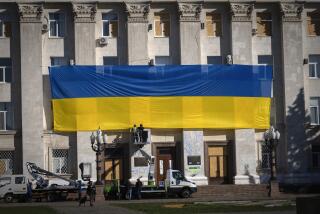For Kuwaiti Community, a Day of <i> Kismet</i> : Exiles: Word of possible withdrawal comes on their homeland’s National Day. Their joy is tempered by worries of reported atrocities by Iraq against civilians.
- Share via
It happened, coincidentally, on Kuwait’s National Day, the 30th anniversary of the tiny country’s independence from British colonial authority.
After more than six months of brutal occupation, Iraqi forces apparently had been ordered by Saddam Hussein to abandon the land he so recently claimed as his country’s 19th province.
Although Washington was downplaying the significance of the announcement by Baghdad radio, some Kuwaitis in exile in Southern California let themselves feel the joy of a Fourth of July and Cinco de Mayo rolled into one.
“I am very, very, very, very, very happy,” said Hussain Ghulum, a 34-year-old Kuwaiti national who lives in Laguna Hills. “The news keeps getting better and better.”
Yet others still wondered about relatives and friends who remained inside what is euphemisticly called the “Kuwait theater of operations.” The joy that liberation is imminent has been tempered by continuous, unconfirmed reports of executions, torture and other atrocities against Kuwaitis.
At a 30th National Day banquet at the Baldwin Park Hilton Monday night, the mood was somber and tinged with wariness of the reports from Baghdad.
“I’m just afraid Saddam Hussein is going to try to get his troops out and then pull something really horrific,” said an American woman who fled Kuwait six weeks after the invasion with her two children. “I’m afraid what they’re going to find when they go into Kuwait City.”
From the start, the event, organized by Kuwaitis in Southern California, had been billed as “a solemn commemoration.” After U.S. warplanes struck Baghdad, reports of young Kuwaiti exiles dancing in Cairo discos while young men of other countries risked their lives proved a national embarrassment.
At the ceremony, Kuwaitis read passages from the Koran and observed a moment of silence for the soldiers who had died “to protect Saudi Arabia and to free Kuwait.”
Photographs hanging on the walls were of torture victims. The caption beneath one identified a severely beaten Kuwaiti man as a “graduate of an Iraqi chamber of torture.”
The photographs were visual versions of the stories trickling out from the resistance, stories so horrible that Kuwaitis here can only hope they are exaggerations. One recent report said that between “four and 20” Kuwaiti women had been executed and hanged naked in Kuwait City.
“This is when your stomach starts to not digest anything,” said Ridha Khayat, a Kuwaiti graduate student at USC. “On an emotional level, you take the extreme as true . . . If you take a logical stand, you cannot deny them or confirm them. But you can’t avoid the emotional fluctuations with the news.”
“We’re just praying it’s not as bad as we hear,” said Ghulum. “I really doubt it, but that’s what we’re hoping.”
Many Kuwaitis said the fate of their families is foremost in their minds. For most, weeks had passed since the last word about their relatives--and then it was often secondhand, something passed on through a friend.
Ghulum said he has had no contact with his large family inside Kuwait--his mother, seven siblings and their families--since before the Iraqi invasion Aug. 2.
Several hours before reports of an Iraqi withdrawal were broadcast, Ziyad Sha’ar, a Fresno real estate developer and Kuwaiti national, had heard that coalition forces had entered the outskirts of Kuwait city. He received that report from a friend in Cyprus said to be in contact via satellite to cousins in Kuwait who had access to a portable phone.
“Basically, I’m trying to find out how my family is doing inside Kuwait. And if the advancement is as far north as I think it is, our little city would be liberated.”
Sha’ar, 36, was worried that his 28-year-old brother would “be a prime candidate” for Iraqi death squads. He also worried that his hometown of Salwa, a suburb south of Kuwait City near the coast, would be hammered by shelling from U.S. battleships.
Another of Sha’ar’s brothers is a 24-year-old student in the United States who volunteered for military service and is assigned as a guide and interpreter to a U.S. combat unit. “I’m hoping he would be in there. Kuwait would be a good sight,” Sha’ar said.
One measure of Kuwaiti liberation was the decision by Sha’ar and Anwar Mudhaf, a graduate student at Claremont College, to agree that their full names be published. They had previously declined, fearing reprisals against family inside Kuwait.
“I tremble whenever I hear of these atrocities,” Mudhaf said. “Now there are fires in Kuwait, in the hotels and government buildings.” He said he was “glad and happy” about assurances from Saudi Arabian authorities that Iraqis would be held responsible for war crimes.
Even if the Iraqis appear to be beaten, Mudhaf said he hoped coalition forces would press the war toward a surrender.
More to Read
Sign up for Essential California
The most important California stories and recommendations in your inbox every morning.
You may occasionally receive promotional content from the Los Angeles Times.










